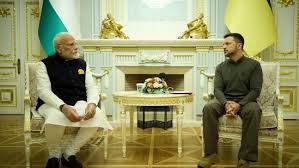Not taking sides: On Prime Minister Modi’s Ukraine visit
Narendra Modi’s visit to Ukraine was more a balancing act than a peace effort
Six weeks after his visit to Moscow, Prime Minister Narendra Modi’s trip to Kyiv and meeting with Ukrainian President Volodymyr Zelenskyy on Friday (August 23, 2024) was largely seen as an exercise in balancing India’s position on the Russia-Ukraine war. Since Russia first invaded Ukraine in February 2022, India has maintained a uniquely distant position from the war: abstaining from all resolutions at the United Nations that dealt with the conflict and were critical of Russia. India also ignored western sanctions, particularly on payments for oil imports and defence hardware from Russia, and did not accept Mr. Zelenskyy’s requests to include Ukraine in the G-20 summit last year or to send a high-level political participation to the Swiss peace summit in June this year. India’s disapproval of Russia’s actions was instead couched in the language of peace, all of cold comfort for Ukraine, which was seeking a clear alignment with its cause, and deeply critical of Mr. Modi’s Moscow visit. That Mr. Modi made the visit at all, the first by any Indian Prime Minister since Ukraine’s independence in 1991, is significant, and is being watched for signals of any major change in India’s policy on the war. During his short visit, the two leaders discussed the conflict, and later visited a memorial for children killed in the war. Unlike other international leaders visiting Kyiv since 2022, Mr. Modi did not meet with any war casualties or injured soldiers and civilians. The two sides signed agreements on cooperation in agriculture, culture, medical products and assistance for community development projects. The leaders did not, however, speak of progress on other outlooked issues, including a strategic partnership, or supplies of telecom and medical infrastructure, and construction equipment that Ukraine has requested.
The broader question around the visit was whether India would now play a larger role in resolving the conflict which includes an idea propounded by Kyiv for another summit in November. Mr. Modi has also become one of a handful of world leaders, from Indonesia, Türkiye, South Africa and Hungary, to have visited Kyiv and Moscow, and, hence, in a position to reach out to both with peace initiatives. As a leader of the Global South, India has a stake in ensuring that the impact of the war in Europe and sanctions do not continue to imperil the developing and under-developed nations. However, New Delhi has thus far not shown an interest in more than passing messages when required, sending officials to Doha and Bürgenstock when invited to attend peace dialogues, and encouraging the two parties to deal directly with each other. Unless that understanding of India’s interest changes, it would seem Mr. Modi’s visit followed form, but did not fundamentally move the needle on the global peace effort. Nor did the substance greatly outweigh the symbolism of the much-awaited visit.
